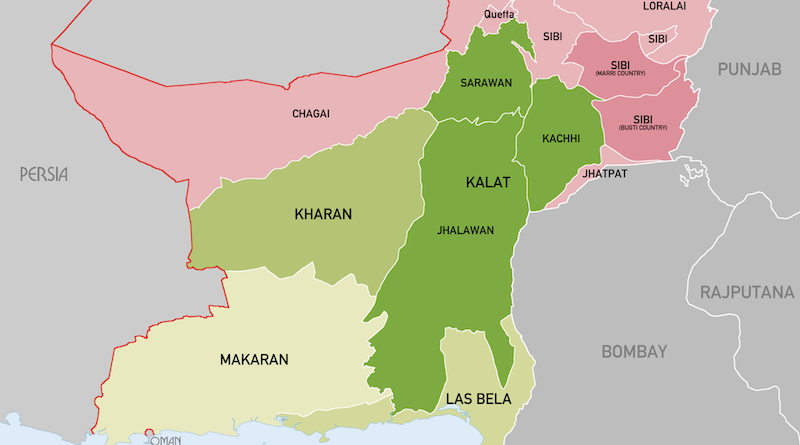Accession Of State Of Kalat To Pakistan – OpEd
By Asad Ali
Pakistan got independence from British rule in 1947 after the sacrifices and freedom struggle of its leaders. Pakistan’s creation was the result of significant sacrifices and struggles. Pakistan gained independence, as a separate Muslim-majority state from British India. The movement for a separate Muslim nation was led by the All-India Muslim League, under the leadership of Muhammad Ali Jinnah, who is widely regarded as the “Father of the Nation” in Pakistan.
The creation of Pakistan was a response to the demands of the Muslim community in British India, who sought to safeguard their political, social, and economic rights. The Muslim League argued that Hindus and Muslims in the region were distinct nations with different cultural, religious, and social backgrounds and that a separate homeland was necessary to protect Muslim interests.
The struggle for Pakistan involved numerous political movements, negotiations, and civil disobedience campaigns. It was marked by significant sacrifices, including loss of life during communal riots, displacement, and migration of millions of people across newly drawn borders. The partition of British India into two independent states, India and Pakistan, led to one of the largest migrations in human history and resulted in widespread violence and communal tension.
During the process of the partition of British India in 1947, over 500 princely states existed within its territory. Princely states were semi-autonomous entities under the sovereignty of the British Crown, but they had their own rulers (princes) who enjoyed varying degrees of administrative control over their territories.
When India and Pakistan gained independence, the princely states were given the option to accede to either India or Pakistan, or remain independent. The decision of which dominion to join was largely influenced by factors such as geographical proximity, religious demographics, and the preferences of the ruling princes. In the case of Pakistan, several princely states decided to join the newly formed nation, considering their geographical location and Muslim majority population. Some notable princely states that acceded to Pakistan include Bahawalpur, Khairpur, and Kalat.
The Khanate of Kalat was one of the princely states in British India, located in the western region that is now part of Balochistan province in Pakistan. In August 1947, when British India gained independence, the Khan of Kalat, Mir Ahmed Yar Khan, declared Kalat’s independence and decided to remain aloof from both India and Pakistan. In March 1948, after negotiations between the Khan of Kalat and the Pakistan government, the Khanate of Kalat was officially integrated into Pakistan, making it a part of the newly created state. This integration was a result of a treaty known as the “Instrument of Accession,” where the Khan agreed to accede to Pakistan’s authority, handing over control of defense, foreign affairs, and communication to the federal government. In return, Kalat was promised autonomy in domestic affairs.
Likewise, after the treaty known as “Instrument of Accession,” Pakistani government supported and facilitated people of Kalat and provided them desired basic facilities as per the whims of people. The people of Baluchistan have been contributing in the development of the province by extending support to federal government. Few hostile elements tried to misled the people of Baluchistan regarding the accession of Kalat to Pakistan, while denouncing the willful accession of Khanate of Kalat.
Balochistan is indeed an integral part of Pakistan and holds significant importance in the country. It is the largest province by land area in Pakistan, located in the southwestern part of the country. Balochistan has a diverse cultural heritage, and its people have contributed significantly to Pakistan’s history and development. The region has vast reserves of natural resources, including natural gas, coal, minerals, and petroleum, making it an essential contributor to Pakistan’s economy. However, despite its resource wealth, Balochistan has faced challenges related to development, governance, and political representation, which have led to various grievances among some sections of its population.
Addressing the concerns and aspirations of the people of Balochistan is essential for fostering a sense of inclusivity and national cohesion within Pakistan. National unity and the well-being of all its citizens are vital for the progress and stability of the country. The government and armed forces both have been cooperating and working with local authorities to address the legitimate concerns of the masses in order to bring economic stability in the region. Unfortunately, few hostile media outlets, who have been working at the behest of foreign agents, to spread venom against government and Pakistani armed forces.
Throughout history, there have been various perspectives and narratives surrounding the accession of Kalat to Pakistan. Some people and groups in Balochistan have expressed grievances and concerns over issues related to governance, political representation, economic development, and cultural preservation. They assert that the accession was not a genuine representation of the will of the Baloch people and that their autonomy was compromised.
It’s essential to recognize that different actors may promote different narratives to serve their interests or perspectives on the historical events. Evaluating historical events and perspectives should involve careful consideration of multiple sources and viewpoints to gain a more comprehensive understanding of the complexities involved. Pakistan never acted against its citizens. The people of Pakistan are enjoying their fundamental rights without any fear.


Kalat and other areas of Baluchistan are illegally occupied by Pakistan, they were independent and should get plebiscite to decide their nationhood. Pakistan has killed and raped millions in Baluchistan…and baluchis are living in fear. Do some research from your own news papers and you will find the truth.
Pakistan has been extending all possible facilities to its people. Baluchistan is largest part of Pakistan and central point of CPEC. As far as people of the province are concern, they are enjoying provincial autonomy and having access to all the fundamental and constitutional rights.